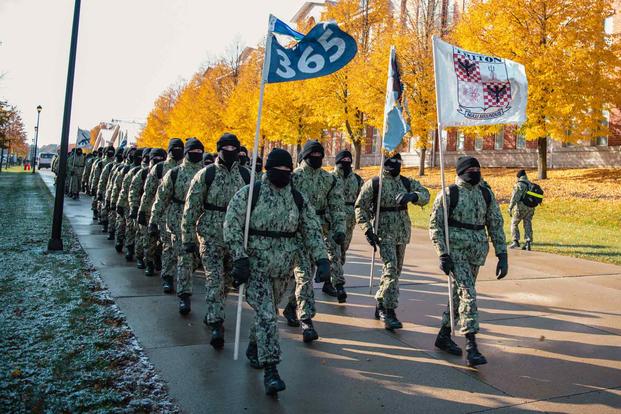Recruiting patterns in the military have increasingly come to reflect the nation's red state-blue state political divide, with recruiting strong in the South and Midwest but lagging on the coasts, retired Army Brig. Gen. Michael Meese said at a Rand Corp. event Thursday.
"When you look at it regionally, the North and the West tend to be less positive" on military service "than the South and the Midwest," said Meese, the former head of West Point's Department of Social Sciences.
"The implications of that for recruiting are problematic," he said, "because where are you going to fish" to fill out the ranks?
The pattern has been in place for decades and, should it continue, Meese said, he could envision a time 50 years from now when recruits from New York and Oregon would number in the single digits, "and everybody else is gonna be from Georgia and North Carolina" despite the ongoing efforts of the services to attract recruits nationwide.
Meese, president of the American Armed Forces Mutual Aid Association, spoke at a Rand panel discussion on "What Americans Think About Veterans," which amounted to a review of a Rand report in December that examined possible factors in what the Pentagon has called a "crisis" in recruiting.
The report found that Americans still think highly of veterans, but a majority (54%) would recommend against joining the military, particularly in the enlisted ranks. However, nearly two-thirds of those surveyed said they would tell a 17-year-old to join as an officer, either through the Reserve Officers' Training Corps, known as ROTC, or the military academies.
"Although the public still holds the military generally in high esteem compared with other major institutions, that esteem is wavering, influenced by such factors as the end of the war in Afghanistan, the increased polarization of the public, and heightened politicization of the military," the Rand report said.
The Rand report followed several other surveys and studies last year that also showed a decline in the trust and confidence the public gives the military, resulting in another year of missed recruiting goals.
In November, the annual defense survey by the Ronald Reagan Presidential Foundation and Institute found that only a slim majority (51%) of Americans would recommend that family and friends join the military, while 33% would discourage military service.
The 51% figure was a significant decline from the results of the 2018 Reagan Foundation survey, when 70% said they would recommend joining the military. About half of the respondents to the foundation's survey attributed the decline to "so-called 'woke' practices undermining military effectiveness" and unit cohesion.
In July, a Gallup poll showed that only 60% of the public expressed a "great deal" or "quite a lot" of confidence in the military, the lowest marks in the poll since 1997. "Republicans have been the most likely to express confidence in the military, and they remain so today, but the rate has declined by over 20 percentage points in three years, from 91% to 68%," the poll said.
The military also has to contend with drawing recruits from a stressed-out society, according to the latest "Stress in America" survey conducted by the Harris Poll for the American Psychological Association and released in November.
"The COVID-19 pandemic, global conflicts, racism and racial injustice, inflation, and climate-related disasters are all weighing on the collective consciousness of Americans," the survey said.
Few of the respondents to the survey "reported confidence about the direction our country is going (34%) or said they feel that their government representatives have their best interests in mind (31%)," the APA said.
The growing doubts about military service coupled with other factors -- ranging from low unemployment to the prevalence of youth obesity and the closing of high schools to recruiters during the pandemic -- have all contributed to fewer and fewer young Americans signing up for the military.
In fiscal 2023, only the Marine Corps and the Space Force among the five service branches met their recruiting goals. The Army fell short by about 10,000 of its goal to bring on 65,000 active-duty enlisted soldiers; the Air Force recruited only 24,100 of the 26,877 it wanted; and the Navy recruited 30,236 active-duty enlisted sailors, well short of its goal of 37,000.
The shortfall "understates the challenge before us as the services lowered [their] end-strength goals in recent years, in part because of the difficult recruiting environment," Ashish Vazirani, the Pentagon's acting undersecretary for personnel and readiness, told the House Armed Services Military personnel subcommittee last month.
The result is that "the all-volunteer force faces one of its greatest challenges since [its] inception" in 1973 when then-President Richard Nixon ended the draft, Vazirani said, and the demographics argue against a quick turnaround.
He testified that fewer and fewer young Americans have a parent who served in the military, which greatly decreases the propensity to serve. "In 1995, 40% of young people had a parent who served in the military but by 2022, just 12% had a parent who had served," Vazirani said.
"This has led to a disconnect between the military and a large share of society," he said.
In November, Army Secretary Christine Wormuth mused about the possibility of getting past the disconnect with a little help from Tom Cruise. At a Duke University Program in American Grand Strategy session, Wormuth said the Army would "love to find [its] 'Top Gun,'" referring to the boost in recruiting the Navy got from the "Top Gun" movies.
Barring an assist from Hollywood, Wormuth said the Army would focus on modernizing its recruiting methods to include creating a new recruiting MOS, or military occupational specialty, to be called MOS 42T, which will be aimed at talent acquisition.
"We are still relying heavily on call lists and solicitations in places like fast-food restaurants, gyms and shopping malls," she said. "These methods may have worked for us when unemployment was high, but in today's extremely competitive labor market, they have put us at a distinct disadvantage" in contacting and recruiting from Gen Z, the generation born after 1997.
"For us, it is an existential challenge, particularly given the very dangerous security environment that we are facing," Wormuth said. "We need to build back our end strengths so we can continue fulfilling our mission, and the only way we can do that is by recruiting significantly more young Americans to serve in uniform."
Traditionally, recruiting has been good when the economy is struggling and young Americans have difficulty entering the civilian workforce, but reports from the Bureau of Labor Statistics and other government agencies show that inflation is easing, the labor market is strong and unemployment was below 4% for all of 2023.
Wormuth also pushed back on the notion that the Army has gone "woke" in its efforts at diversity and inclusion, which allegedly have taken resources away from training and deployments. She said the "wokeness" charges stemmed from the hyper-partisan political climate gripping the nation and challenged the critics to come see firsthand how the Army trains.
Duke University political science Professor Peter Feaver, who moderated the discussion with Wormuth, told Military.com last Thursday that charges of wokeness in the military have primarily come from Republicans who have shifted from "adoration of the military to criticism of the military."
"There's no evidence that the military itself is woke" or has been taken over by the political left, Feaver said in a phone interview, but there is evidence that the wokeness charges are having an impact on what the military calls the "influencers" -- the coaches, pastors and respected adults in communities who are sought out for advice by young Americans.
"There are a lot of things in the category of what I call 'more rocks in the rucksack'" for the military in dealing with the recruiting problem, Feaver said, including the effects of the humiliating withdrawal from Afghanistan on how military service is perceived.
In addition, the Defense Department estimates that only 23% of Americans aged 17 to 24 would qualify for military service and the rest would be rejected for being overweight, abusing drugs, or having mental and physical health problems.
"There's nothing the military can do about that," Feaver said.
Veterans groups have noted with concern the reports and surveys on the military's recruiting problems, and the 1.4 million-member Veterans of Foreign Wars took particular exception to charges by some congressional Republicans that the military going woke was discouraging young Americans from joining, said Ryan Gallucci, assistant adjutant general of the VFW and an Army veteran of Iraq.
"We've had these discussions on Capitol Hill" with those alleging that the current administration is presiding over a woke military and delivered the message that "You need to knock that off," Gallucci said.












